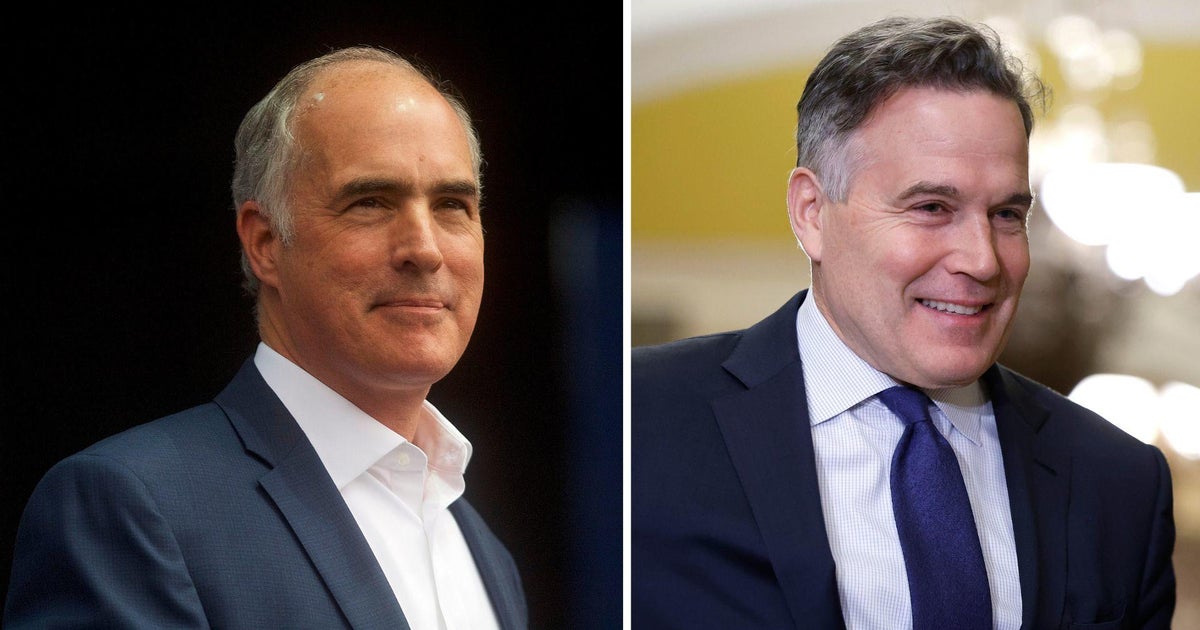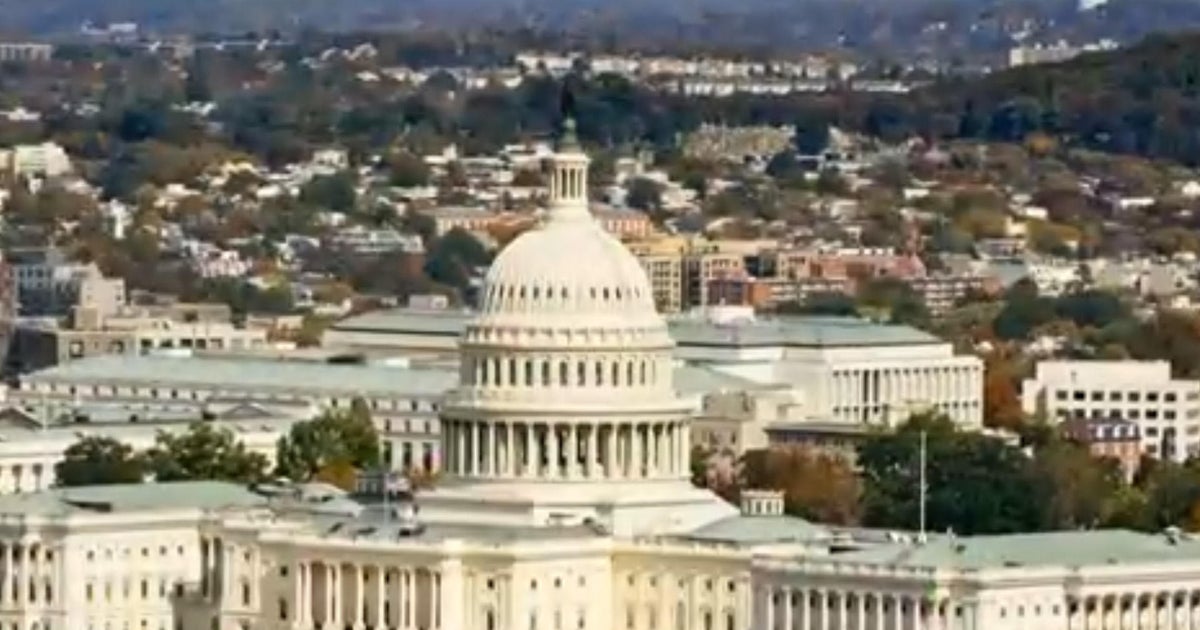CBS News
Recount triggered in Pennsylvania Senate race as McCormick heads to D.C., Casey declines to concede

Sen. Bob Casey is not giving up on retaining his U.S. Senate seat. The three-term Democrat is currently locked in a tight race with Dave McCormick, trailing the Republican by just over 29,000 votes as of 4 p.m. Wednesday. CBS News has not issued a projection in the race.
Pennsylvania Secretary of the Commonwealth Al Schmidt announced Wednesday afternoon that unofficial results in the race have triggered a statewide recount.
That’s because vote totals for McCormick and Casey are within a 0.5% margin, which triggers a statewide recount under state law.
According to the Department of State, Casey received 48.5% of the vote with 3,350,972 votes and McCormick had 48.93% with 3,380,310.
Counties must begin the recount by Nov. 20, the announcement says. The recount will cost about $1 million in taxpayer funds, the Department of State says.
Casey has not made a public appearance since his election night watch party in Scranton, but he posted a video on his social media accounts Tuesday.
“The American democratic process was born in Pennsylvania, and that process will play out,” he said in the video on X.
Meanwhile, McCormick is moving forward. The businessman declared victory during a speech in Pittsburgh Friday, and he has spent this week in Washington going through the Senate orientation process.
“The people have spoken. There’s a clear, clear victory,” McCormick said last week.
CBS News Philadelphia reached out to both campaigns Wednesday, but neither made the candidates available to speak.
Casey’s campaign has said it’s been waiting for outstanding votes from around the state, from mail-in ballots to overseas and military votes and provisional ballots. In Philadelphia, the state’s largest county and one where Casey has garnered more than 78% of the vote, commissioners say the number of votes left out there is running thin.
“We had about 20,000 provisional ballots to start with. We’ve already counted 11,000 of those,” city commissioner Seth Bluestein said Wednesday.
Bluestein told CBS News Philadelphia the election board wrapped up voting on outstanding mail-in votes Wednesday. He says a few thousand could not be counted for various reasons, mostly a lack of a signature or secrecy envelope.
As for the remaining provisional ballots, Bluestein said the board will take those up on Friday. But he warned, “most of those will probably end up not getting counted.”
According to a statement from the Pennsylvania Department of State, Casey’s campaign did not waive an automatic recount by noon on Wednesday.
The Department of Stats says there are about 60,366 uncounted provisional ballots and 20,155 uncounted mail-in and absentee ballots. That includes ballots for which officials still need to determine eligibility or validity.
CBS News
Tropical Storm Sara near Mexico, could strengthen and slam U.S.

Watch CBS News
Be the first to know
Get browser notifications for breaking news, live events, and exclusive reporting.
CBS News
Person trapped beneath building collapse rubble, Kentucky officials say

Watch CBS News
Be the first to know
Get browser notifications for breaking news, live events, and exclusive reporting.
CBS News
Can Trump appoint Matt Gaetz without Senate confirmation? Here’s what to know about recess appointments

Washington — President-elect Donald Trump’s selection of former Rep. Matt Gaetz to be attorney general is his most controversial Cabinet pick yet, and the Florida Republican is likely to face obstacles in the confirmation process.
But Trump is seeking an important change to the Senate confirmation process that would allow him to install some officials and sidestep lengthy hearings and a floor vote, in which nominees need a majority vote to be confirmed.
Before Senate Republicans elected their leaders for the 119th Congress, Trump demanded that the candidates agree to recess appointments, which would give him the option of bypassing the Senate’s role of approving or rejecting the president’s nominations. Trump argued that without the ability to temporarily install nominees he would not be able to fill the positions in a timely manner.
The legal basis for recess appointments emanates from a constitutional clause that gives the president “the power to fill up all vacancies that may happen during the recess of the Senate.” A Supreme Court ruling in 2014 concluded that recess appointments could only be made when the Senate is not in session for 10 or more days, after President Barack Obama made controversial appointments when senators were on break.
Senators often leave Washington for long stretches of time, but have utilized pro forma sessions to prevent presidents from installing nominees without their consent.
“In recent years, the Senate — regardless of which party controlled it — has used pro forma sessions to ensure that it is never in recess for more than three days,” said Josh Chafetz, a law and politics professor at Georgetown University.
For Trump to make recess appointments, the Senate would have to agree, through a simple majority vote, to go on recess for at least 10 days. The House must also agree to allow the Senate to adjourn, but Chavetz says if the House does not agree, or if it disagrees with the Senate on the length of adjournment, then the president has the constitutional power to adjourn both chambers for a timeframe of his choosing.
“That second route has never been used before in U.S. history, so no one is quite sure how it would work,” Chafetz said.
A recess appointment, however, does not have the same benefits as a nominee confirmed by the Senate. Without Senate approval, the appointee would not be paid. The appointee can serve in the role for up to two years, depending on when the appointment was made. After that, the individual could be installed again through a recess appointment or the regular confirmation process.
Some senators, including Republicans who will be in the majority come January, showed little appetite for giving up their constitutional power, especially after Trump announced that he intended to nominate Gaetz to lead the Justice Department.
“I was shocked,” Republican Sen. Susan Collins of Maine said Wednesday. “If the president proceeds with that nominee, I think it shows the importance of having the Senate advice and consent process.”
Gaetz resigned from Congress on Wednesday after Trump announced his selection. The timing came days before a House panel was set to vote on releasing a report on whether Gaetz engaged in sexual misconduct. Gaetz was also the subject of a previous Justice Department investigation that sought to determine if Gaetz violated sex trafficking and obstruction of justice laws. No charges were filed, and Gaetz has denied any wrongdoing.
“We have a process around here for considering presidential nominees,” Republican Sen. John Cornyn of Texas said Thursday when asked by reporters about Gaetz. “That’s a constitutional responsibility of the Senate, and I intend to play my part as a member of the Judiciary Committee in doing that vetting and advice and consent.”
“I don’t think we should be circumventing the Senate’s responsibilities, but I think it’s premature to be talking about recess appointments,” Cornyn added.
The Senate Judiciary Committee is responsible for conducting confirmation hearings for the attorney general nominee. Several other Judiciary Committee members also weighed in Thursday.
“The bottom line is our responsibility in the Senate is advice and consent,” said Democratic Sen. Dick Durbin of Illinois, the committee chairman.
Republican Sen. Thom Tillis of North Carolina said recess appointments should be used “judiciously,” adding that he has concerns about “blanket recess appointments.”
Democratic Sen. Richard Blumenthal of Connecticut said he could name between “five to 10 Republicans who are seriously considering voting against” Gaetz “and insisting that there will be a vote.”
Republican Sen. Josh Hawley of Missouri indicated he would not have an issue if Trump made recess appointments, saying the president “has total authority to make recess appointments.”
Democratic Sen. Chris Coons of Delaware urged his Republican colleagues to protect their role in confirmations and encourage Trump to pick confirmable candidates.
and
contributed to this report.








